2018 would see the French Grand Prix return to the Formula One calendar after a decade. The race has been a regular on the calendar since the first Formula One season in 1950, albeit for a break in 1955.
The Grand Prix has been a racing event since 1906 and has been interchanged between 16 different circuits.
While the Frenchman, Alain Prost held a special affection for the track, winning six times at three different circuits, it was the German, Michael Schumacher who was a complete master of the fixture, winning it a record eight times.
This year, the French Grand Prix will be held at Circuit Paul Ricard which has already hosted the race 14 times previously between 1971 and 1990.
The circuit has a knack for declaring Championship winners, six of the 14 winners went on to win one that year. Only two people who have conquered this French circuit have been unable to make claim to a Championship, Ronnie Peterson (1973-4) and René Arnoux (1982).
After the Grand Prix shifted to Circuit de Nevers Magny-Cours, the Paul Ricard circuit was developed as a testing facility and is now recognized as one of the safest tracks on the map.
The most distinguishing feature of the track has to be the application of black and blue paint as run-off areas in place of the typical gravel traps.
The French Grand Prix has seen some exhilarating races over the years and we have attempted to trim the best from the rest.
Let’s have a look at some of the best French Grand Prix races of all time, in no particular order:
#1 1999 French Grand Prix
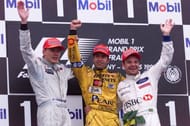
If any racing fan feels that there is not enough overtaking in today’s Formula One, all they need to do is watch the 1999 French Grand Prix to satiate their hunger. After seeing the official qualifying sheet, it is hard to imagine how the race ended up with the podium that it did.
Mika Häkkinen showed a masterclass of overtaking, starting the race in the 14th position and ending up second. Even before the rain started falling, the Finnish driver was chasing down Rubens Barrichello for the win after passing Jean Alesi, Michael Schumacher, and Olivier Panis, among others.
After the rain began to fall, everyone scrambled to the pits for a tyre change. The Finn then tried an overtaking maneuver on Rubens resulting in spinning and falling back down to the seventh position.
The two-time World Champion made back all those positions by lap 60 and was in the lead when he pitted for fuel along with Rubens, leaving a clear field for Heinz-Herald Frentzen to take the win.
The race finished with only 11 drivers still running out of the 22 that had started and the podium comprised of Frentzen, Häkkinen, and Barrichello, in that order.
#2 1985 French Grand Prix
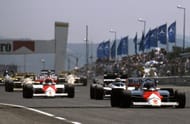
The 1985 French Grand Prix seems to be a race of gearbox failures, with three of the ten drivers retiring at least partially due to it.
Nelson Piquet started on the third row, but he quietly overtook the four drivers ahead of him even with the chaos surrounding him.
He ultimately cruised to victory, but the battle for second lasted till the final lap when Keke Rosberg passed Alain Prost.
Keke had gotten fresh tires fitted on his car after being left behind in third by Prost and Piquet and the strategy seemed to pull through for him.
Before the race even began, a crash during qualifying put Nigel Mansell out of contention with a concussion.
The catch fencing at the Signes corner caused problems for Ayrton Senna too, who started on the front row behind Keke. Senna has gearbox problems during the race and subsequently, his engine failed and oil started leaking onto his rear tyres, causing a spin into the fencing. He suffered injuries, but was back for the next race of the season.
#3 1981 French Grand Prix
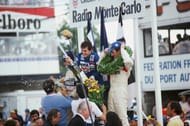
The 1981 French Grand Prix was a race of two halves. It began raining cats and dogs in the middle of the race, bringing the Grand Prix to an abrupt halt. The result of the race was decided as an aggregate of times from both parts.
The Grand Prix was the first of Alain Prost’s 51 wins. He began the race on the second row of the grid with René Arnoux and John Watson ahead of him.
The initial few laps of the race were packed with excitement as it saw Nelson Piquet take the lead from John, Prost, Andrea de Cesaris and Gilles Villeneuve, with the pole position holder slipping down to ninth place.
Despite a loose front wing and a lack of fourth gear, the Frenchman caught up to the race leader Nelson after overtaking the McLaren of Watson. It was on lap 58 that the rain began to fall.
At the restart, Prost stole the lead from Piquet and even though he was challenged for the race win by John, he secured the team a win. Watson came in second, in front of Nelson and Arnoux.
#4 1977 French Grand Prix
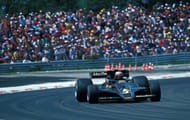
One look at the qualifying and race results and one would never believe that the race was ever interesting. Mario Andretti managed a hat-trick during the race, qualifying on pole, running the fastest lap during the race and finally going on to win it.
However, Mario did not have a clean start to the race, which allowed James Hunt, Jacques Laffite, and John Watson to get past him.
The American then played catch up for the rest of the race, and the final laps saw a nail-biting battle between Mario and Watson, who was by then in the lead of the race.
Unfortunately for John, his engine seemed to give way on the last lap and while he was able to bring the car in and secure the second position, the win was grabbed by Andretti.
#5 1990 French Grand Prix
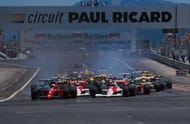
The 1990 French Grand Prix was truly extraordinary for more than one reason.
Nigel Mansell qualified on pole and led at the start with Gerhard Berger and Ayrton Senna close behind.
Ivan Capelli and Mauricio Gugelmin of Leyton House started seventh and tenth, respectively. Almost everyone held onto their positions till the time for pit stops came around.
The Paul Ricard circuit, and in particular, the long straight, helped Leyton House’s aerodynamic package and that coupled with astounding tyre managed ensure that their two drivers were holding onto a one-two for the team.
Unfortunately for the team, the engines did not hold up as well as their tyres and was the cause of Gugelmin’s retirement of lap 58. Capelli, meanwhile, held onto the lead despite pressure from Prost for more than 20 laps, until his engine started giving problems.
The Italian driver finished second behind Prost, but the other hero behind the performance was the man who had designed the car, Adrian Newey.
Adrian had already been sacked by Leyton House and was well on his way to Williams, but the race proved the man’s prowess at designing cars.
